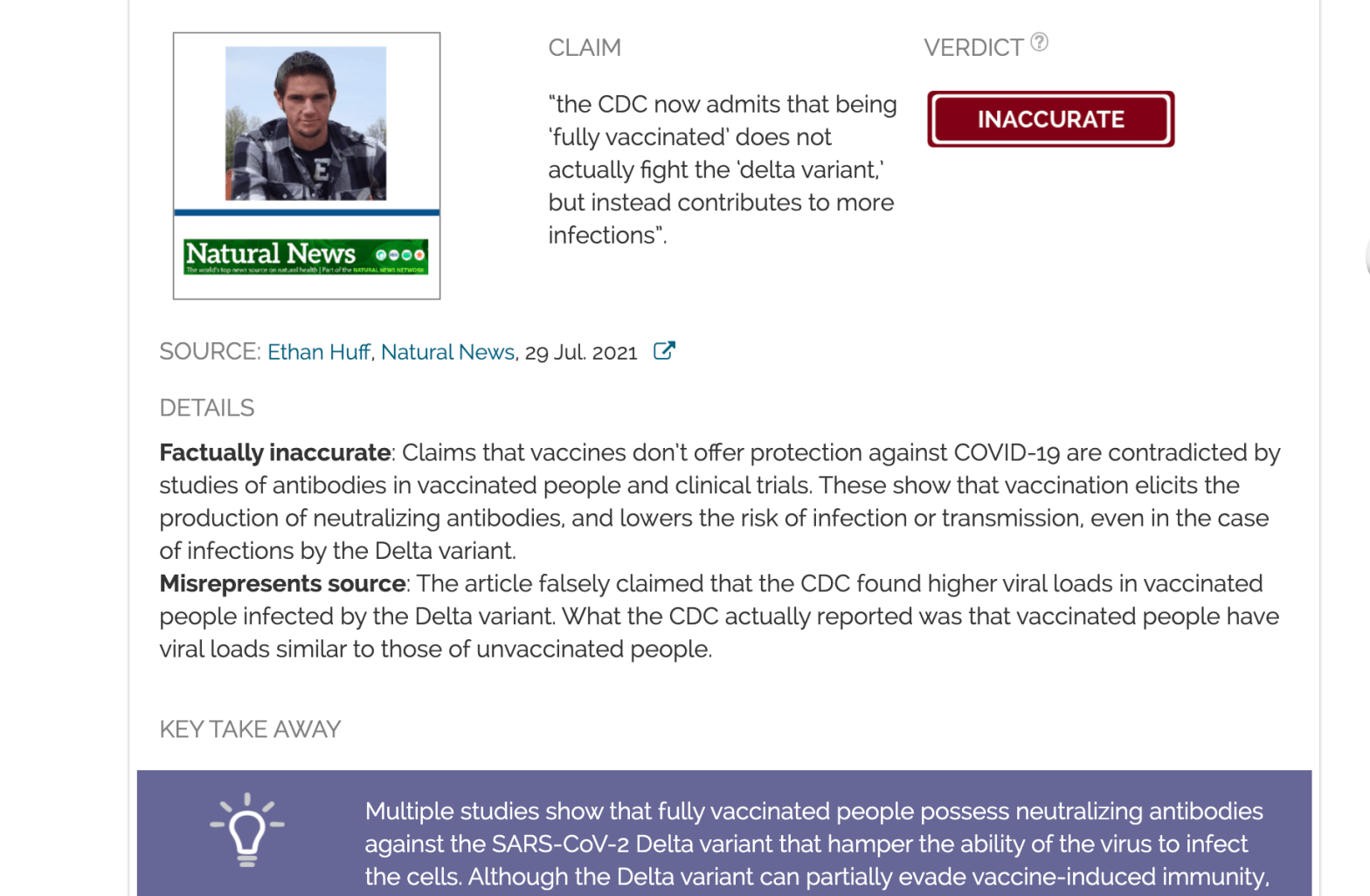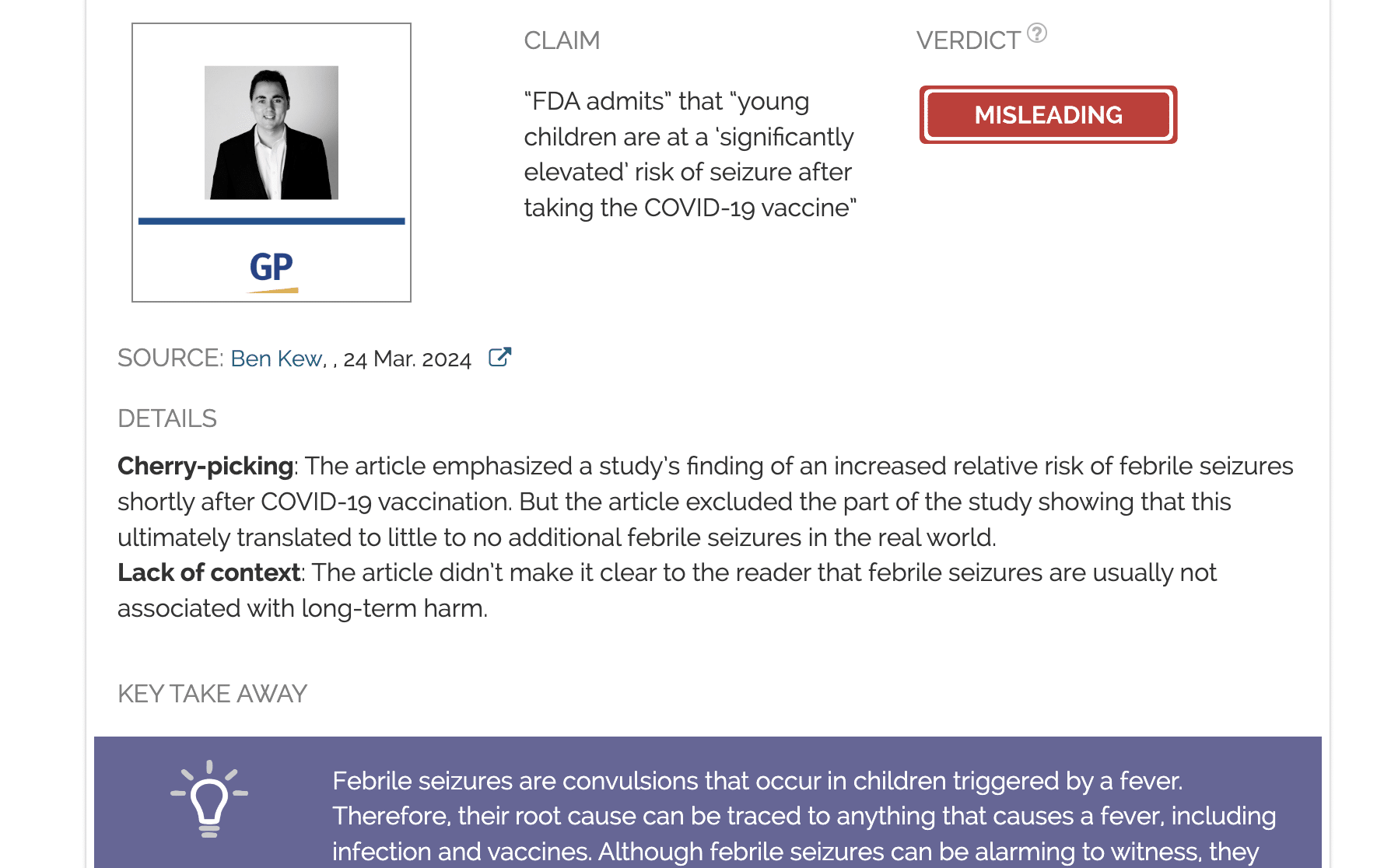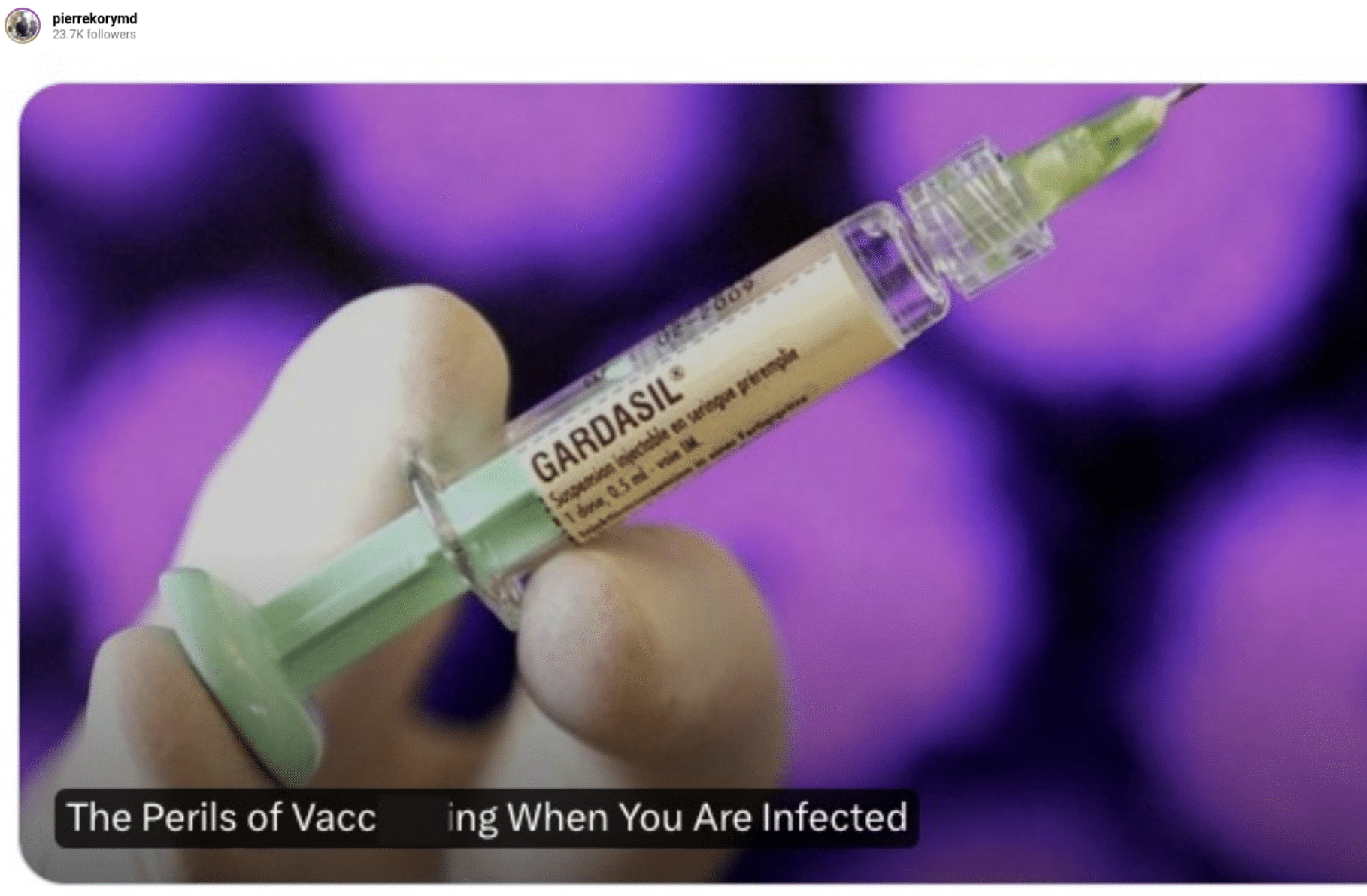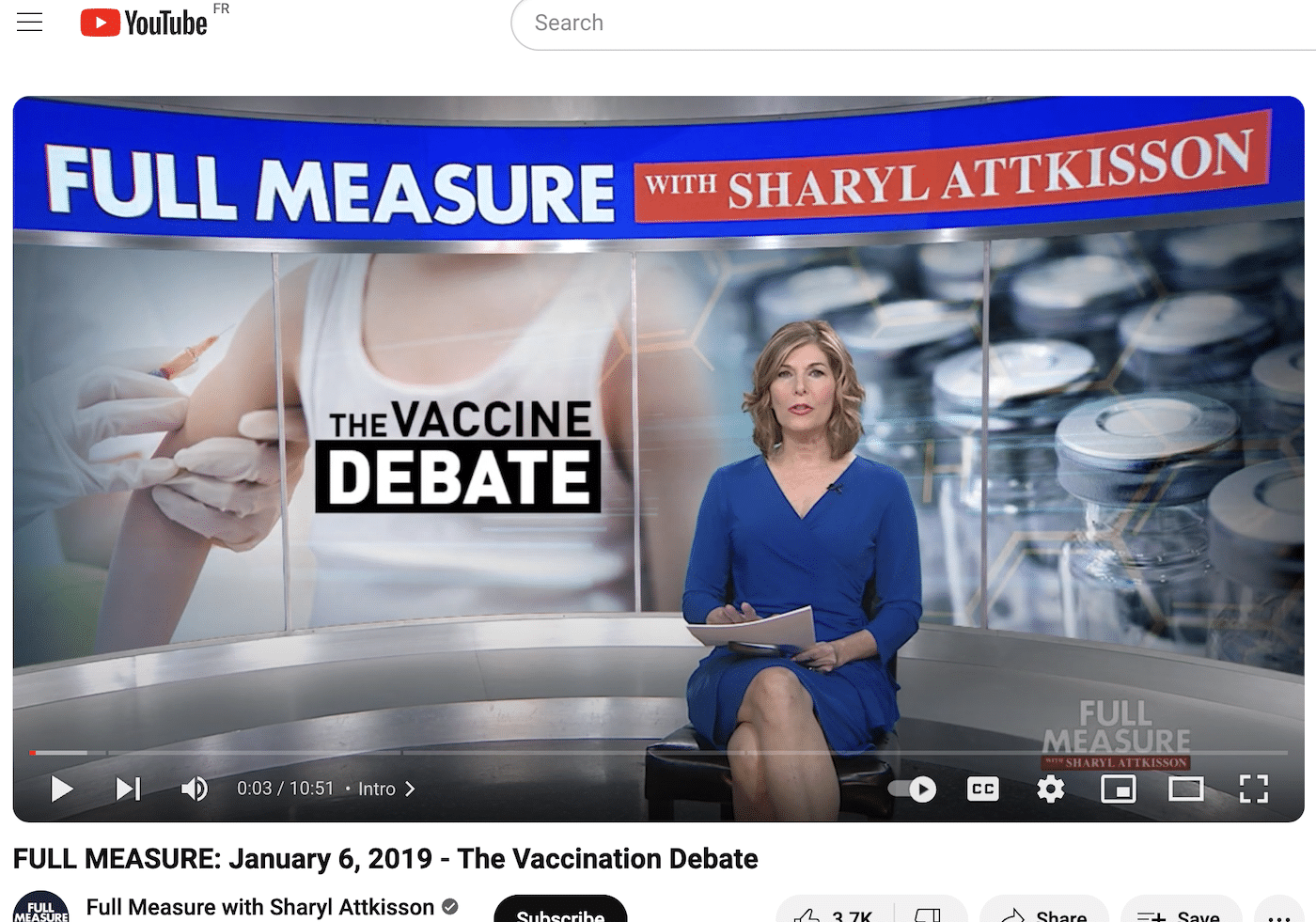- Health
Compared to unvaccinated people, vaccinated individuals are more protected against the Delta variant
Key takeaway
Multiple studies show that fully vaccinated people possess neutralizing antibodies against the SARS-CoV-2 Delta variant that hamper the ability of the virus to infect the cells. Although the Delta variant can partially evade vaccine-induced immunity, vaccination lowers the risk of developing symptomatic and severe disease. While infected people who are vaccinated show similar viral loads to unvaccinated people, the viral load decreases more quickly in vaccinated people, suggesting that the period during which they are contagious is shorter. This would reduce their capacity for transmission.
Reviewed content

Verdict:
Claim:
“the CDC now admits that being ‘fully vaccinated’ does not actually fight the ‘delta variant,’ but instead contributes to more infections”
Verdict detail
Factually inaccurate: Claims that vaccines don’t offer protection against COVID-19 are contradicted by studies of antibodies in vaccinated people and clinical trials. These show that vaccination elicits the production of neutralizing antibodies, and lowers the risk of infection or transmission, even in the case of infections by the Delta variant.
Misrepresents source: The article falsely claimed that the CDC found higher viral loads in vaccinated people infected by the Delta variant. What the CDC actually reported was that vaccinated people have viral loads similar to those of unvaccinated people.
Full Claim
“the CDC now admits that being “fully vaccinated” does not actually fight the ‘delta variant,’ but instead contributes to more infections.” COVID-19 vaccines provide “no protection against infection or spread”; vaccinated people “have HIGHER viral loads and can be super-spreaders”
Review
The U.S. initiated a nationwide COVID-19 vaccination campaign in mid-December 2020 after clinical trials showed that COVID-19 vaccines were safe and effective. As of 7 August 2021, more than 166 million people (50.1% of the population) were fully vaccinated in the country.
The vaccination was first accompanied by a steady decline in the number of new detected cases. However, COVID-19 cases, hospitalizations, and deaths went back on the rise in July 2021, mostly associated with the SARS-CoV-2 Delta variant, formerly known as B.1.617.2 and first described in India in October 2020. The Delta variant proved to be more contagious than the other variants. In the U.S. its spread began in May 2021 before becoming the dominant cause of infections in July of the same year.
Some interpreted the COVID-19 surge as evidence that vaccines were ineffective at protecting vaccinated people. One example is this article by Ethan Huff, published in Natural News in late July 2021. Huff alleged that the U.S. Centers for Disease Control and Prevention (CDC) acknowledged the failure of COVID-19 vaccines. He further claimed that vaccinated people weren’t better protected than unvaccinated individuals against the Delta variant, and were in fact more contagious because vaccinated people carried a higher viral load. However, these claims are all inaccurate and contradicted by available scientific evidence as we explain below.
The Delta variant, first detected in India, accounted for 1.3% of COVID-19 cases in the U.S. in early May 2021 and 92% of the cases by the end of July 2021, illustrating its capacity for transmission. According to the American Society for Microbiology, preliminary studies suggest that the Delta variant is 40% to 60% more transmissible than the Alpha variant and associated with a higher risk of hospitalization.
On 29 July 2021, the Washington Post reported that an internal CDC document, regarding then-unpublished data, showed that the Delta variant may infect vaccinated and unvaccinated people alike and that vaccinated individuals may remain contagious. The study containing these findings were later published in the CDC’s Mortality and Morbidity Weekly Report.
The study reported that the majority (74%) of 426 COVID-19 cases detected in July 2021 in Massachusetts occurred in fully vaccinated people. This rate is higher than the vaccine coverage of Massachusetts of 69%. If the vaccination prevented infection, we would expect the proportion of vaccinated individuals to be lower among the infected group than in the general population.
Furthermore, PCR tests carried out on the patients suggested that vaccinated and unvaccinated patients had similar viral loads. Indeed, the median Ct value from PCR testing was 22.77 among vaccinated and 21.54 among unvaccinated. The Ct value is inversely proportional to the amount of viral genetic material in the sample: the lower the Ct value, the higher the amount. Given that a high viral load may be associated with high viral shedding and higher contagiousness, this prompted the CDC to change its recommendations on public health measures like mask-wearing for vaccinated people.
These results and the Washington Post article formed the basis for the claim by Huff that the vaccine is ineffective. One of the main inaccuracies in Huff’s article is that the CDC never stated that vaccinated people had higher viral load. Rather, it said that vaccinated and unvaccinated people showed similar viral loads.
While the data from the CDC are concerning, one must look more broadly at other aspects of the vaccine’s performance, in order to assess whether the vaccines are effective against the Delta variant.
First, vaccines induce the production of antibodies able to neutralize the virus. Neutralizing antibodies bind to a specific virus in a way that interferes with the virus’ ability to infect cells and thus limit its spread in the body. The level of neutralizing antibodies is an important predictor of whether a person develops disease[1]. This knowledge has led researchers to investigate whether the blood of vaccinated people contain neutralizing antibodies against the Delta variant specifically.
In fact, multiple studies found that vaccinated people do have detectable levels of neutralizing antibodies against the Delta variant, albeit lower than against other variants[2,3,4]. In one study reporting these findings, the authors concluded that “protective immunity conferred by the mRNA vaccines is most likely retained against the [Delta variant].”[3]
In another of these studies, researchers at the Pasteur Institute also compared antibodies collected from people who had received only one dose of vaccine and others who were fully vaccinated. They found that full vaccination (two doses of vaccine) was necessary in order to detect the presence of neutralizing activity against the Delta variant[4]. This observation is consistent with the hypothesis that the Delta variant can partially evade the immune system.
Altogether those data shows that fully vaccinated individuals should be able to better resist the Delta variant compared to the unvaccinated or the partially vaccinated, contrary to what Huff claimed.
Data from England corroborated the Pasteur Institute’s observation. Researchers calculated vaccine effectiveness based on the proportion of symptomatic COVID-19 cases among vaccinated and unvaccinated people. They found the effectiveness against the Delta variant was only 30% after one dose of vaccine, but rose to 80% after two doses. This means that full vaccination reduced the number of people falling ill by almost 80% compared to the unvaccinated group[5].
Two studies that have not yet been peer-reviewed—one from Wisconsin and another from Singapore—corroborate the U.S. CDC’s observation that infections by the Delta variants presented similar viral loads in vaccinated and unvaccinated alike[6,7]. The viral load is a good predictor of the infected person’s contagiousness[8,9]. This is thus a concerning observation, as it suggests that vaccinated people could remain just as contagious.
However, the study from Singapore also reported a faster decrease of the viral load in vaccinated than in unvaccinated people[7]. Importantly, they also observed a lower risk of developing severe disease in the vaccinated group. This means that even though vaccinated individuals could still get infected, they would be less vulnerable to the disease and would remain contagious for a shorter amount of time.
Conclusion
Claims that COVID-19 vaccines are ineffective in the face of the Delta variant are inaccurate and contradicted by scientific evidence. Although the Delta variant is able to partially bypass the vaccine-induced immunity, studies on neutralizing antibodies and clinical observations in vaccinated people show that vaccination protects individuals against the virus in several ways. For example, it lowers the risk of infection by fostering the production of neutralizing antibodies. It also reduces the risk of severe COVID-19 in the event that infection occurs. Vaccination can also reduce the viral load in infected people, which could have the dual effect of both reducing disease severity and transmissibility in vaccinated people.
READ MORE
This article published by Science Magazine explained the Delta variant’s features and summarizing the available data at the time of writing.
Other outlets fact-checked similar claims and found them inaccurate.
REFERENCES
- 1 – Khoury et al. (2021) Neutralizing antibody levels are highly predictive of immune protection from symptomatic SARS-CoV-2 infection. Nature medicine
- 2 – Liu et al. (2021) Reduced neutralization of SARS-CoV-2 B.1.617 by vaccine and convalescent serum. Cell.
- 3 – Edara et al. (2021) Infection and Vaccine-Induced Neutralizing-Antibody Responses to the SARS-CoV-2 B.1.617 Variants. The New England Journal of Medicine.
- 4 – Planas et al. (2021) Reduced sensitivity of SARS-CoV-2 variant Delta to antibody neutralization. Nature.
- 5 – Lopez Bernal et al. (2021) Effectiveness of Covid-19 Vaccines against the B.1.617.2 (Delta) Variant. The New England Journal of Medicine.
- 6 – Riemersma et al. (2021) Vaccinated and unvaccinated individuals have similar viral loads in communities with a high prevalence of the SARS-CoV-2 delta variant. MedRXiv (pre-publication)
- 7 – Chia et al. (2021) Virological and serological kinetics of SARS-CoV-2 Delta variant vaccine-breakthrough infections: a multi-center cohort study. MedRXiv (pre-publication).
- 8 – Kawasuji et al. (2020) Transmissibility of COVID-19 depends on the viral load around onset in adult and symptomatic patients. Plos One.
- 9 – Marks et al. (2021) Transmission of COVID-19 in 282 clusters in Catalonia, Spain: a cohort study. The Lancet Infectious Disease.



